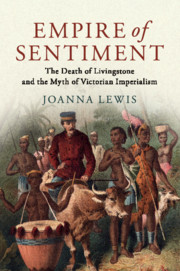Book contents
- Frontmatter
- Dedication
- Contents
- List of Figures
- List of Maps
- Acknowledgements
- Prologue: The Pathetic Death of Bwana Ingeleshi
- Introduction
- 1 ‘A Parliament of Philanthropy’: The Fight to Bury Livingstone
- 2 Laying to Rest a Victorian Myth: The ‘Lost Heart of the Nation’, Victorian Sentimentality & the Rebirth of Moral Imperialism
- 3 A Perfect Savagery: The Livingstone Martyrs & the Tree of Death on Africa's ‘Highway to Hell’
- 4 The Graveyard of Ambition: Missionary Wars, Bachelor Colonialism & White Memorials, Chitambo, 1900– 1913
- 5 White Settlers, Frontier Chic & Colonial Racism: How Livingstone's Three Cs Fell Apart
- 6 ‘The Hearts of Good Men’: 1973, the One- Party State & the Struggle against Apartheid
- 7 ‘Chains of Remembrance’: Livingstone, Sentimental Imperialism & Britain's Africa Conversation, 1913– 2013
- Conclusion
- Epilogue: The Testimony of Pastor Manduli
- Index
2 - Laying to Rest a Victorian Myth: The ‘Lost Heart of the Nation’, Victorian Sentimentality & the Rebirth of Moral Imperialism
Published online by Cambridge University Press: 06 January 2018
- Frontmatter
- Dedication
- Contents
- List of Figures
- List of Maps
- Acknowledgements
- Prologue: The Pathetic Death of Bwana Ingeleshi
- Introduction
- 1 ‘A Parliament of Philanthropy’: The Fight to Bury Livingstone
- 2 Laying to Rest a Victorian Myth: The ‘Lost Heart of the Nation’, Victorian Sentimentality & the Rebirth of Moral Imperialism
- 3 A Perfect Savagery: The Livingstone Martyrs & the Tree of Death on Africa's ‘Highway to Hell’
- 4 The Graveyard of Ambition: Missionary Wars, Bachelor Colonialism & White Memorials, Chitambo, 1900– 1913
- 5 White Settlers, Frontier Chic & Colonial Racism: How Livingstone's Three Cs Fell Apart
- 6 ‘The Hearts of Good Men’: 1973, the One- Party State & the Struggle against Apartheid
- 7 ‘Chains of Remembrance’: Livingstone, Sentimental Imperialism & Britain's Africa Conversation, 1913– 2013
- Conclusion
- Epilogue: The Testimony of Pastor Manduli
- Index
Summary
He will be home, amongst his people, once again, forever.
John Irvine, ITV correspondent, reporting the funeral of Nelson Mandela, 8 December 2013If there is love between us, inconceivably delicious, and profitable will our intercourse be; if not your time is lost and you will only annoy me. I shall seem to you stupid, and the reputation I have false. All my good is magnetic, and I educate not by my lessons, but by going about my business.
Ralph Waldo Emerson, Representative MenThis chapter tells the story of the four most influential days in the history of imperial propaganda. The climax of a combination of press coverage, popular sentiment and public mobilisation would transform Livingstone's death into a rich emotional resource for the project of an empire in Africa. Livingstone's chaotic and bodged funeral wavered between a wake, a celebration of Britain's anti-slavery tradition and a comic operetta. But a clear path towards national redemption came out of it. Thousands, primed by press coverage, flocked to see the cortège and attend the ceremonials. A spontaneous outbreak of weeping at the sight of his coffin took many onlookers by surprise. It was not just the affecting nature of his death which produced a powerful surge of feeling. What gathered in strength was a highly sentimental image of Livingstone's love for his African ‘boys’, their corresponding love of him and the suffering of Africa.
As such, this event brings the history of empire closer to the history of emotions. Spontaneous and manipulated feeling merged to become a powerful force shaping Britain's conversation about Africa and its subsequent will to empire. Nevertheless, it was a case of the local intersecting with the global, of the inner life marrying with the external circumstances. Through feeling and emotion, many men and women in 1874 were staking a claim to political respectability. Soft sensibility was hard currency. Press coverage once again played a crucial role in shaping this emotional conversation between empire and Africa. Yet the press was polyphonic; the interest groups in Britain wanting to direct that conversation and use the press were particularly diverse and multiple at this point. Out of this emerged an imperial project in Africa more widely shared, but it nearly did not happen this way.
- Type
- Chapter
- Information
- Empire of SentimentThe Death of Livingstone and the Myth of Victorian Imperialism, pp. 63 - 91Publisher: Cambridge University PressPrint publication year: 2018



